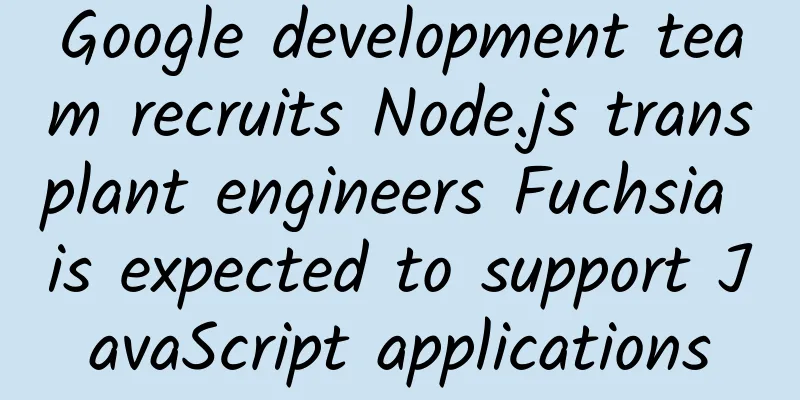Google development team recruits Node.js transplant engineers Fuchsia is expected to support JavaScript applications

|
Google's Fuchsia operating system, which has been secretly developed for three years, seems to be built specifically for mobile and desktop devices, with a real-time kernel and a unique interface. Previously, we already knew that Fuchsia would support programming languages such as Google Dart and Apple Swift. But now, JavaScript may also join the queue. Yesterday, Yang Guo from the Node.js project team tweeted that he was looking for a full-time software engineer to port Node.js to the Fuchsia operating system developed in the Google office in Munich, Germany. If you are not familiar with Node or JavaScript, here is a quick explanation:
It is said to be a popular way to create command-line tools and applications for servers, and Node.js is also a component in Electron.
***, if Fuchsia can provide deep support for the JavaScript language, the development of such applications will become easier. |
>>: Common performance optimization techniques in iOS development
Recommend
If the "marathon runners" of the animal world, the slender-horned gazelle and the cheetah, had a speed contest, who would win?
When it comes to Tibetan antelopes, everyone prob...
Summer waves? Remember to hide from these two "killers"!
Source: Ni Xiaojiang & Jing'an CDC...
User operation: How to do detailed user classification?
User operation is a module of knowledge required ...
Song Yuehan's "Chinese Medicine Syndrome Differentiation Video" teaches you how to accurately diagnose syndromes, and you will understand it after learning it once
Training course video lecture content introductio...
After reading the font series of articles, do you still think I am talking about fonts?
[[208286]] Recently, I have been writing a series...
2021 Yixiantian system development plan Yixiantian chip tactics video + indicators
2021 Yixiantian System Development Plan Yixiantian...
Summary of new features in iOS 10.3: AirPods can also locate and sound when lost
Apple released the first developer beta of iOS 10...
How to attract user traffic and trigger social communication?
Today’s topic is how to ignite social communicati...
How to avoid invalid clicks in bidding advertising and SEM delivery?
In Internet advertising, paid-per-click advertisi...
Little-known fact: What are the differences between boys in the eyes of the opposite sex?
Girls prefer boys with more "feminine featur...
"Kombucha", which has been popular both at home and abroad recently, can control oil, protect the intestines, and lower blood sugar?
gossip “Kombucha can protect the intestines, cont...
In special times, how can the retail industry operate private domain traffic well?
A sudden epidemic has brought community (WeChat g...
What is the reason for the instability of Beijing website ranking marketing?
Many webmasters or network operators have to do t...
Fermentation makes food full of "magic", what kind of process is this?
Fermentation is nature's "magic". I...
The battle for the entrance to the living room has ended with the removal of TV clients from multiple video websites?
"This round of OTT rectification by the radi...









